The AMD Threadripper 2990WX 32-Core and 2950X 16-Core Review
by Dr. Ian Cutress on August 13, 2018 9:00 AM ESTHEDT Benchmarks: Office Tests
The Office test suite is designed to focus around more industry standard tests that focus on office workflows, system meetings, some synthetics, but we also bundle compiler performance in with this section. For users that have to evaluate hardware in general, these are usually the benchmarks that most consider.
PCMark 10: Industry Standard System Profiler
Futuremark, now known as UL, has developed benchmarks that have become industry standards for around two decades. The latest complete system test suite is PCMark 10, upgrading over PCMark 8 with updated tests and more OpenCL invested into use cases such as video streaming.
PCMark splits its scores into about 14 different areas, including application startup, web, spreadsheets, photo editing, rendering, video conferencing, and physics. We post all of these numbers in our benchmark database, Bench, however the key metric for the review is the overall score.
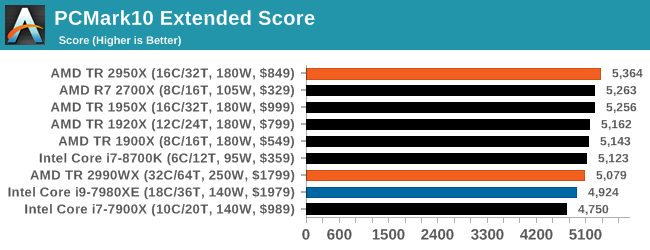
One of the downsides of PCMark is that it seems to bunch up all the results, showing them relatively close together, but interestingly here that the Intel processors sit near the bottom, with the 2950X and 2700X on the podium.
Chromium Compile: Windows VC++ Compile of Chrome 56
A large number of AnandTech readers are software engineers, looking at how the hardware they use performs. While compiling a Linux kernel is ‘standard’ for the reviewers who often compile, our test is a little more varied – we are using the windows instructions to compile Chrome, specifically a Chrome 56 build from March 2017, as that was when we built the test. Google quite handily gives instructions on how to compile with Windows, along with a 400k file download for the repo.
In our test, using Google’s instructions, we use the MSVC compiler and ninja developer tools to manage the compile. As you may expect, the benchmark is variably threaded, with a mix of DRAM requirements that benefit from faster caches. Data procured in our test is the time taken for the compile, which we convert into compiles per day.
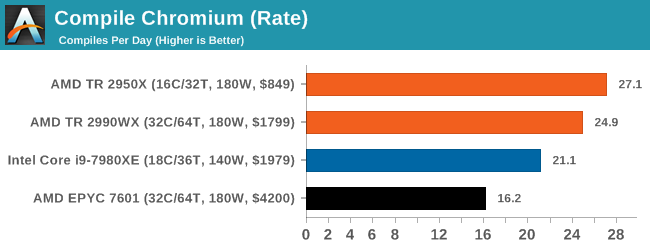
This test is such a nice mix of ST, MT, and memory limited flow that it is really interesting to see where the results end up. Unfortunately for our new suite the output files were not set up correctly, so despite running the test we only ever got a handful of results. But it shows an interesting metric: the 2950X sits ahead of the 2990WX, with both ahead of the Core i9, and the EPYC system being beaten handily due to its lower frequencies.
3DMark Physics: In-Game Physics Compute
Alongside PCMark is 3DMark, Futuremark’s (UL’s) gaming test suite. Each gaming tests consists of one or two GPU heavy scenes, along with a physics test that is indicative of when the test was written and the platform it is aimed at. The main overriding tests, in order of complexity, are Ice Storm, Cloud Gate, Sky Diver, Fire Strike, and Time Spy.
Some of the subtests offer variants, such as Ice Storm Unlimited, which is aimed at mobile platforms with an off-screen rendering, or Fire Strike Ultra which is aimed at high-end 4K systems with lots of the added features turned on. Time Spy also currently has an AVX-512 mode (which we may be using in the future).
For our tests, we report in Bench the results from every physics test, but for the sake of the review we keep it to the most demanding of each scene: Ice Storm Unlimited, Cloud Gate, Sky Diver, Fire Strike Ultra, and Time Spy.
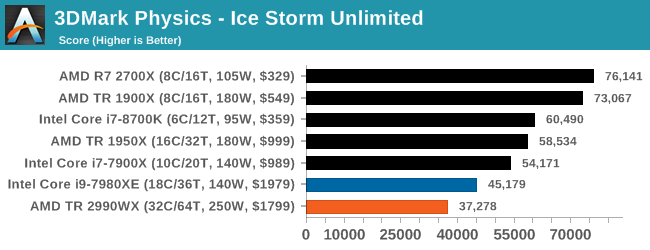
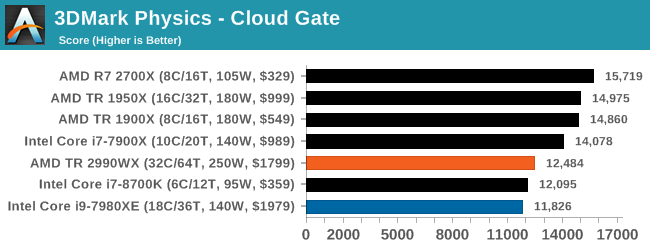
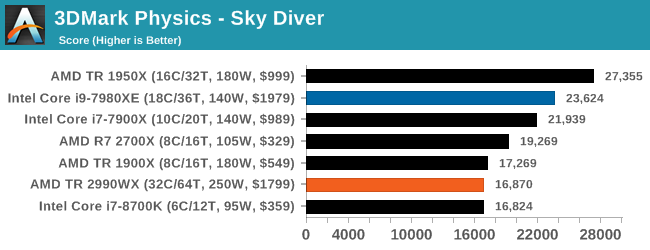
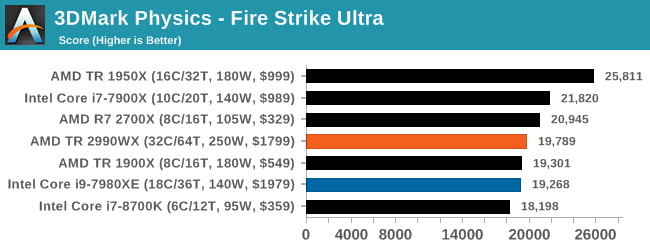
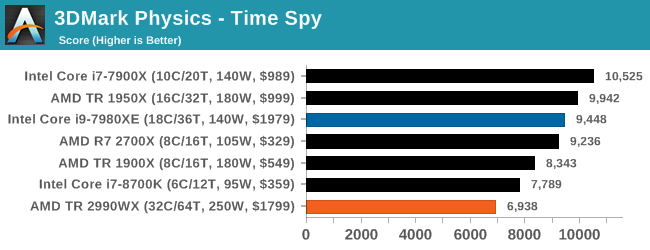
In the low end tests, it is clear that having these big processors doesn’t do much for performance, but even as we go up through Fire Strike and Time Spy, there seems to be a natural limit to the usefulness of these parts. Physics clearly loves having some extra memory bandwidth, and we know Time Spy isn’t meant to scale beyond about 10 cores, but we do see the 10 core processor sitting out front. Some of our testing sweeps had this benchmark configured incorrectly so it will be interesting to see how it fills out with some other mid and high core count processors.
GeekBench4: Synthetics
A common tool for cross-platform testing between mobile, PC, and Mac, GeekBench 4 is an ultimate exercise in synthetic testing across a range of algorithms looking for peak throughput. Tests include encryption, compression, fast fourier transform, memory operations, n-body physics, matrix operations, histogram manipulation, and HTML parsing.
I’m including this test due to popular demand, although the results do come across as overly synthetic, and a lot of users often put a lot of weight behind the test due to the fact that it is compiled across different platforms (although with different compilers).
We record the main subtest scores (Crypto, Integer, Floating Point, Memory) in our benchmark database, but for the review we post the overall single and multi-threaded results.
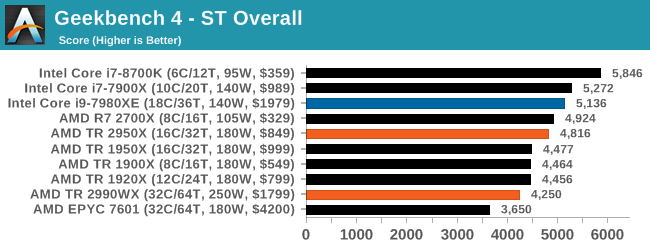
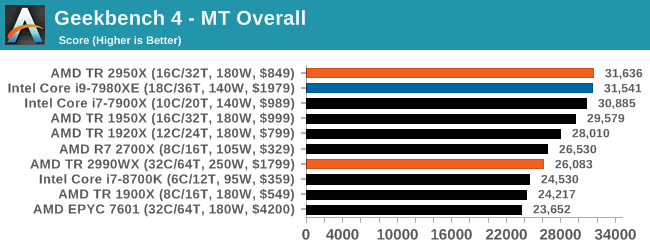










171 Comments
View All Comments
MrSpadge - Monday, August 13, 2018 - link
I don't think AVX512 is going to matter much anytime soon. However, The 8 memory channels of EPYC could matter a lot for HPC.ElFenix - Monday, August 13, 2018 - link
You guys need a 4k or maybe even 5k workload for transcoding - it's thread limited at 1080p so it becomes IPC and turbo limited. With x265 you can load up multiple 1080p handbrake instances on these high core count processors and they don't break a sweat.ElFenix - Monday, August 13, 2018 - link
That should be *1080p spawns limited numbers of threads*T1beriu - Monday, August 13, 2018 - link
>Europe is famed for its lack of air conditioning everywhereUK is a lot colder generally in the summer compared to the rest of Europe. I wouldn't generalize the lack of AC for the rest of Europe. AC is pretty common in my country.
jospoortvliet - Saturday, August 18, 2018 - link
Missing everywhere here in Germany... though after this insanely hot summer i bet that that will begin to change...powerincarnate - Monday, August 13, 2018 - link
I didn't see a lot of gaming benchmarks, which I guess I understand, since these are more workstation cpus. It would be good to have seen both though to get a better idea of the overall qualities of the cpu as a multipurpose care.It seems from tomshardware benches that 7980xe, especially when overclocked, is best overall. AMD 2990wx obviously winning on the pure multi-threaded workstation stuff as long as it is not memory intensive.
It seems like the 2950x from both of these sites, is really the processor to get from the threadripper lineup.
it seems when gaming is taken to account, the best of both worlds is the 7900x
And for gaming, and when you factor price as well, the 8700k, 8086, and slightly behind, the 2700x are the cards to get.
Overall.... I'm a little disappointed in this release. Was much more impressed with the 2700x. It's likely since we didn't really get a true change in the manufacturing process or design of the chip, that the limitations of the 2990wx will probably be ironed out with Zen2 (this is Zen+ after all).
bill.rookard - Monday, August 13, 2018 - link
Looking at it myself, yeah - these really aren't gaming CPUs by any stretch of the imagination, thus the lack of gaming benchmarks is perfectly understandable to me. As for the results of the benchmark results? I'm thinking the 2950x is the sweet spot. Lower power, lower latency, more power for the cores vs interconnects, and a much higher clockspeed makes it IMHO the better choice unless you have those fringe workloads which requires a bunch-o-cores.shendxx - Monday, August 13, 2018 - link
this guy come from Toms that said 7900x is best for both world, lol, when the graph from toms show clearly even on gaming, 2950x is equal on Minimum FPS with 8700k and only lose 3 to 10 FPS On Average,apoclypse - Monday, August 13, 2018 - link
I don't know. Gaming performance is the least thing I care about with this chip but that seems be all most tech press cares about, especially tech tubers. These chips are not for gaming. If anything these chips should be compared to Intel's Xeon line as it seems that is actually where AMD is aiming these at since they don't have a dedicated SKU for workstation chips like Intel. These are only marketed as HEDT chips because it gives AMD positive press, but if anything the ones who should be paying attention should be OEM high end workstation builders. In that regard Threadripper is more than compelling. It's higher clocked than Intel's Xeon chips, has more cores for less money, and still has all the pro level features that is needed for workstation level work.I think AMD should lean into that a bit more in their marketing but that stuff isn't sexy and it doesn't grab attention like marketing it towards rich and stupid "gamers", and the technorati who eat that stuff up.
This is a workstation chip period, and should be treated, tested and benchmarked as such, imo.
Icehawk - Monday, August 13, 2018 - link
If only the tier 1 vendors would offer TR workstations... I really wanted to purchase a few for work to use as VM hosts but my only real option is Xeon currently. The 32 core monster would likely make for a great VM host for mid-weight usage.